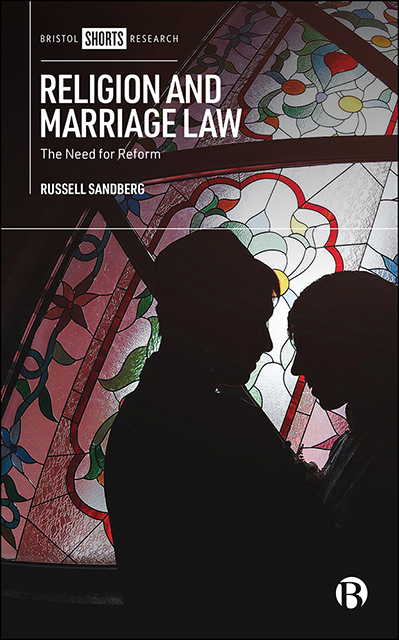Six - The Law Commissions Proposals
Published online by Cambridge University Press: 18 April 2023
Summary
Introduction
The previous chapters have laid out the need for reform: the Marriage Act 1949 is unprincipled and unequal, providing a legal framework which is the product of historical quirk and not only reflects the Christian origins of marriage law but also indirectly discriminates against some religious traditions. The welcome progressive reforms of recent years have been bolted on to this antiquated framework in a way that makes the law overly complicated and also shows that the focus has been only on regulating particular forms of relationships. The antiquated, ineffective and unjust nature of the law has led to a number of marriages taking place extra-legally and this has led to two specific issues of concern: unregistered religious marriages and non-religious marriages. In short, the law on marriage no longer reflects the social reality of adult intimate relationships in the 21st century.
Given this, it is unsurprising that while the Law Commission's task for their scoping paper was to make the case for reform, their focus in their consultation paper has been instead to argue what reforms are needed. This chapter explores and analyses the reforms suggested by the Law Commission's consultation paper, published in September 2020, which proposes a transformation of the law on how people get married. The consultation paper proposes ‘an officiant-focused scheme’ which would replace the current law's focus on registered buildings. The Law Commission's main proposals can be summarised as follows.
• All weddings would be required to take place in the presence of one authorised officiant who would be responsible for ensuring that the legal requirements are met. The officiant could be, but would not need to be, the celebrant.
• The following could be officiants: (1) registration officers; (2) Anglican clergy; (3) nominated officiants from any religion or belief body; (4) independent officiants who apply directly to the General Register Office or Registrar General.
• Each of the couple would need to give at least 28 days’ notice and this would take the form of two steps: (1) the initial giving of notice, which might take place remotely (for example, by post or online); and (2) an in-person meeting with a registration officer.
• Weddings would take place according to the form and ceremony chosen by the parties and agreed by the officiant. This could include weddings outside. The only requirement would be for the parties to express their consent to be married.
- Type
- Chapter
- Information
- Religion and Marriage LawThe Need for Reform, pp. 65 - 92Publisher: Bristol University PressPrint publication year: 2021



